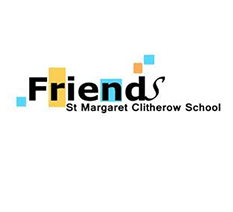English
Reading Statement of Intent
At St Margaret Clitherow Primary School, we are committed to providing a high-quality English education that develops pupils into fluent readers who can effectively communicate their ideas and emotions to others. Our reading curriculum is built around immersing pupils in high-quality, challenging texts that develop vocabulary, comprehension skills, and a lifelong love of reading.
We implement the rigorous Little Wandle systematic phonics programme in the early teaching of reading when children begin school. This DfE-validated scheme provides a structured, consistent approach with clearly defined progression, enabling children to develop secure decoding skills. For pupils who need additional support, our Little Wandle catch-up programme ensures targeted intervention in Key Stage 1 & 2, preventing any child from falling behind in their reading journey.
Our whole-class reading approach enables all children to access texts beyond their independent reading level through teacher modeling of fluency, intonation, and comprehension strategies. This approach benefits all learners by:
- Immersing pupils in high-quality children's literature
- Developing speaking and listening skills alongside comprehension
- Providing more time for modelling skills rather than just assessment
- Improving behaviour for learning as all pupils engage with the same text
We encourage all pupils to read widely across both fiction and non-fiction to develop:
- Knowledge of themselves and the world around them
- An appreciation and love of reading
- Strong comprehension skills through high-level questioning and discussion
- The ability to make connections between texts
Our reading curriculum is carefully structured to ensure that by the end of their primary education, all pupils can read fluently and with confidence across all subjects, preparing them for success in their secondary education.
Writing Statement of Intent
At St Margaret Clitherow Primary School, writing is a crucial part of our curriculum. All children from EYFS to Year 6 are provided with many opportunities to develop and apply their writing skills across the curriculum.
Our writing curriculum follows a clear, structured process of planning, drafting, evaluating/editing, proofreading, and presenting. This consistent approach across all year groups ensures pupils develop the skills to produce well-structured, purposeful writing for a variety of audiences and contexts.
We intend for pupils to become confident, creative writers who can:
- Plan, revise and evaluate their writing effectively
- Develop transcription skills (spelling and handwriting) and composition skills
- Demonstrate awareness of audience, purpose and context
- Apply an increasingly wide knowledge of vocabulary and grammar
- Use fluent, legible and speedy handwriting
Our teaching of spelling, vocabulary, and grammar enables pupils to:
- Understand the relationships between words
- Comprehend nuances in meaning
- Develop their understanding and use of figurative language
- Work out and clarify meanings of unknown words and words with multiple meanings
- Control their speaking and writing consciously
- Use Standard English appropriately in both spoken and written contexts
Through our reading and writing curriculum, we aim to develop pupils who not only meet age-related expectations but who also develop a genuine love of language and literature that will stay with them throughout their lives.
Useful Links
Wordless Books Information
Click here for an overview of Literacy themes
English Curriculum Intent Overview
Phonics at St Margaret Clitherow School
- The systematic teaching of phonics has a high priority throughout Foundation Stage and Key Stage Phonics is taught daily to all children in Foundation Stage, Year 1 and those in Year 2 who have not passed phonics screening in Year 1.
- Staff systematically teach learners the relationship between sounds and the written spelling patterns, or graphemes, which represent them.
- Intervention is planned for those children who are working below expected levels
- We reviewed the Phonics' programme and we are now using Little Wandle Phonics' Scheme. Our staff has been trained in delivering this scheme
- Pupils will be given Reading books which match the phase of phonics that they are currently working.
Little Wandle - Letters and Sounds

Little Wandle Resources for Parents
The resources on this link will help you support your child with saying their sounds and writing their letters. There are also some useful videos so you can see how they are taught at school and feel confident about supporting their reading at home.
















